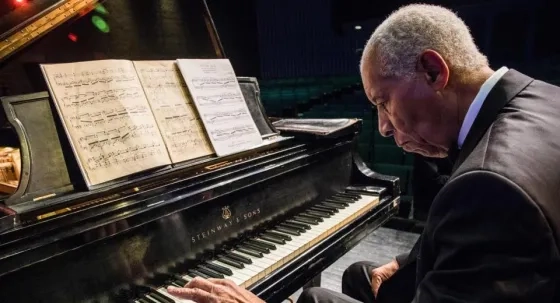SFCM Hosts Movie Premiere: ‘For The Left Hand’ a Film About Music, Loss, and Triumph
The film, which had its West Coast premiere in Barbro Osher Recital Hall celebrates pianist Norman Malone, paralyzed on his right side, and his quest to play a challenging piano concerto.
By Alex Heigl
Norman Malone had every reason to give up. A promising pianist in his youth, he was paralyzed on his right side by an attack when he was just 10 years old. But Malone took the difficult path; and as the poem says, that has made all the distance: He dedicated himself to learning some of the most difficult piano music written for the left hand alone, never telling anyone of this lifelong quest until he was 78 years old, at which point he set on the new path of achieving a lifelong dream: To play with a symphony orchestra.
A film chronicling Malone's story, For the Left Hand, has garnered rave reviews at film festivals and saw its Bay Area premiere at SFCM on Nov. 10 as part of Associate Dean of Diversity, Equity, and Inclusion Jason Hainsworth's initiatives. Hainsworth called the film "a truly compelling story" that "speaks to many things such as racism, ableism but also to perseverance and love of music." Present at the screening were the film's co-director Gordon Quinn and writer and producer Howard Reich (former music critic for the Chicago Tribune), who led a discussion after the film.
"The film started out as a newspaper story," Reich said. "I found out about Norman by coincidence and at that point he was 78. He discovered his love of the piano when he was 5 years old and became quite accomplished. But when he was 10 years old, a terrible thing happened."
Malone's father, recently released from a mental institution and suffering from advanced syphilis, had decided that he was going to die, and thought, in his condition, that he couldn't leave his wife with Norman and his two brothers to raise by herself. One night, he attacked all three of them while they were sleeping before leaving the house and killing himself.
Reich continued, "All three boys survived, but all three were left paralyzed on their right side because they'd all been struck on the left side of their head."
Norman recuperated from the horrifying ordeal and yearned to return to the piano but felt it was impossible, not knowing that there actually is a voluminous library of music written for one-handed piano. And in fact, when Malone told his teachers he hoped to return to the piano, they signed him up for a psych evaluation.
Malone found a teacher and became an accomplished left-handed pianist before entering DePaul University's School of Music. After earning his graduate degree, Malone spent his entire career as a choral teacher in a Chicago public high school, never telling anyone outside of his immediate family where his paralysis stemmed from—or that he was continuing to practice his left-hand repertoire in secret.
After hearing about Malone completely by chance, Reich spent months putting together an article about him, and the resulting tide of interest wound up in Malone's invitation to perform Ravel's Piano Concerto for the Left Hand (which he had been practicing for the last 60 years, and never performed) with the West Hartford Symphony Orchestra.
Left-hand-only piano pieces have existed for years as études or other practice tools for years, but Reich thinks a sea change occurred with Paul Wittgenstein, the brother of famous philosopher Ludwig Wittgenstein. Paul was a talented pianist who volunteered to fight in World War I and lost his right arm in battle. Returning to civilian life, Paul resolved that he would become a left-handed pianist, and spent years developing his left-hand technique. One thing that aided Paul was the Wittgenstein family wealth. So Paul began to use this fortune to commission piano works, including concertos, for the left hand alone. One of the first was Ravel's, but he also commissioned works from other towering composers like Profokiev, Hindemith and Britten, though of all these pieces, the Ravel concerto is played the most; Reich calls it "the greatest of all left-hand concertos."
"The response to the film has really been gratifying, particularly from the music community," Quinn said. "But I think it also raises a lot of questions about disability, and people with disabilities and how they're viewed. And Norman only talks about it a little, but we're able to show how much he was able to contribute to people's lives, as a father, as a teacher, and how much he's done out in the world. All of the arts are a place where people with disabilities find other ways to make connections and expressions, and Norm is a wonderful example of that."
Despite all the weighty subject matter and history, the film is ultimately a testament to the human spirit—and in particular, Malone's. "If you met Norman today, and didn't know everything I just told you," Reich said, "you'd say, 'Obviously, nothing bad ever happened to this man in his life.' He's the most upbeat, life-affirming person. He just goes onward."
Learn more about SFCM's Diversity, Equity and Inclusion initiatives here.
